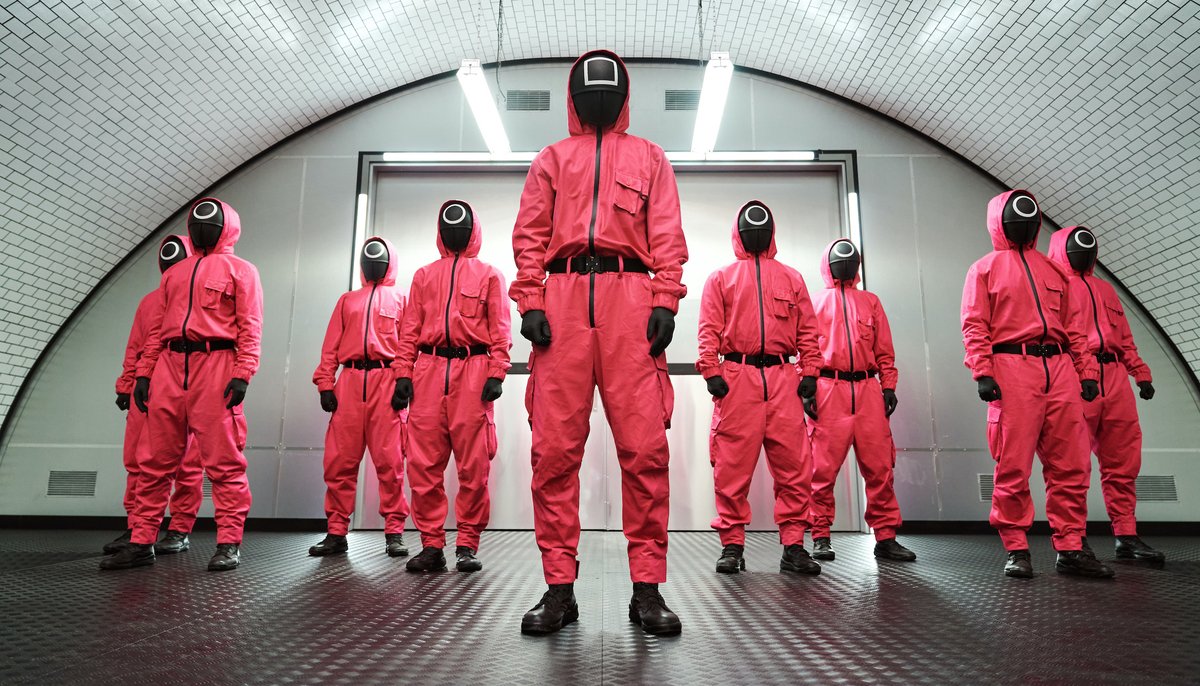No show is more worth your time right now than Netflix’s new hit, “Squid Game.”
On Oct. 12, less than a month after its worldwide release, the South Korean drama became Netflix’s biggest series launch ever, reaching more than 111 million streams and topping Netflix charts in more than 80 countries.
The show’s first, and currently only, season contains just nine episodes that sit at about an hour apiece, making the show perfect for binging.
Squid Game follows the divorced and deeply indebted Seong Gi-hun, played by actor Lee Jung-Jae. Gi-hun lives with his elderly mother is estranged from his ex-wife, and is rarely allowed to visit his daughter, who he learns is moving to America with his ex-wife unless he is able to come up with a large sum of money.
Gi-hun is approached by a well-dressed stranger on the subway, who offers him a chance to play games in exchange for money. In need of a financial miracle, he accepts and is knocked unconscious.
He wakes up in a dormitory with 455 other contestants, all of whom are similarly destitute. Gi-hun and the other contestants soon learn that they are competing in a series of children’s games like red light, green light, and tug-of-war, where each player eliminated adds more money to the potential prize pool.
The only catch: when players get eliminated, they die.
“Squid Game” takes viewers on a fast-paced ride through the violent and thrilling concept of competition and death. The bright, pastel colors that decorate the players and sets distinctly stand out alongside such gritty, brutal bloodshed. The show beautifully reflects this distinction by setting fights to the death and the harsh realities of the real world against the background of children’s games and cash prizes.
Irony and allusions are used beautifully throughout the series as various players’ death, the show’s final twist, and even the children’s games themselves, are hinted at along the way for the more astute viewers to pick up on.
The inherent mystery surrounding each upcoming game, the identities and motives of the game’s workers, and, of course, who will survive, will keep you on the edge of your seat, wanting more. But the show’s largest question, underlying the games from their start, is why? Why set up such elaborate, intricate games?
The answer, revealed in the season’s final episodes, is a haunting one: It was set up by the uber-wealthy, who watch and bet on the games because they had become bored with their lives.
This fits perfectly into one of the show’s central themes: a less-than-veiled critique of capitalism. “Squid Game” follows the trend in recent years of not so glowing commentaries on capitalism in foriegn films such as “Parasite” and “The Platform.”
Hwang Dong-hyuk, the writer and director of “Squid Game,” said that he based the show on his own experiences and struggles with capitalism and economic class differences in South Korea.
The show sends a clear message: life under capitalism just isn’t fair, perhaps even pointless. The players are so down-trodden by the capitalist system in South Korea, and made so desperate, that they would rather risk their lives playing children’s games than continue their lives out in the real world.
Once in the game, the theme continues, as each player’s life is worth a set amount of money, and killing other contestants to get ahead is a more than viable option; a brutally honest comparison with the competition created by capitalism.
As if the horse wasn’t dead already, the truth behind the games beats it one more time. When one of the contestants, a former doctor, and a group of workers are discovered cheating, they are killed and their bodies strung up as a sign to the other players. Along with the visual sign comes a haunting message over the loudspeaker:
“Each and every one of you is considered an equal within the walls of this facility, you must be guaranteed the same opportunities without being disadvantaged or facing any kind of discrimination.”
This, however, proves to be a lie, just as a similar promise inherently implied by capitalism also fails in practice, the show argues.
Whether it’s workers turning off the lights in order to prevent the players from ‘taking the fun out of the game’, or stopping Gi-hun from fighting the final contestant so that one last game can be played, the only real rules of the games are those that the wealthy audiences desire.
As ‘beat you over the head’ as the show’s message becomes, it is still well worth the watch. The sad truths of capitalism, though overblown, are worthy of thought. Not only that, but the thrilling action, tear-jerking betrayals, and brutal sacrifices are captivating, and as the mystery unfolds, you can’t help but get sucked in.


